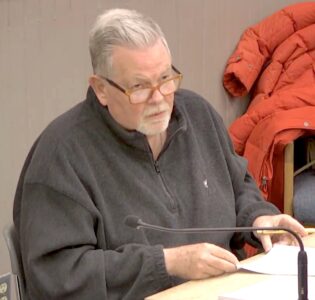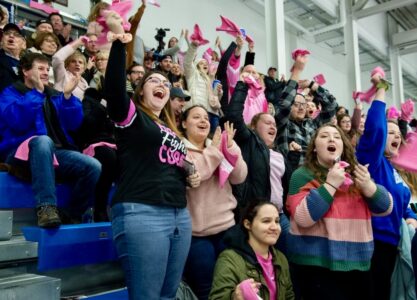American Legion Fredonia Memorial Post 59 welcomes national commander

OBSERVER Photo by Mary Heyl American Legion National Commander Brett P. Reistad, center, recently visited Fredonia American Legion Post 59 to meet members. He was joined by John R. Miga, New York eighth district commander (left) and Gary M. Schacher, New York state commander (right).
Last week the American Legion Fredonia Memorial Post 59 enjoyed a history-making event. For the first time in the post’s 100-year history, the national commander of the American Legion paid a visit to the post to enjoy lunch with members and share his advice on how to expand membership at the local level.
National Commander Brett P. Reistad of Fairfax County, Virginia said that this is his first visit to western New York.
A U.S. Army veteran who served during the Vietnam War, Reistad was also a member of the Old Guard, the Army’s official ceremonial unit and escort to the president. He went on to serve Fairfax County as a police officer for 26 years, and worked for a federally-funded law enforcement assistance program after his retirement. A legionnaire for 38 years, Reistad was elected to serve a one-year term as national commander on Aug. 30, 2018.
Following his lunch at Fredonia’s Post 59, Reistad sat down with the OBSERVER to share the current status of the American Legion, the challenges he believes today’s veterans are facing and the duty of local posts to reach out to new members.
“We’re right now roughly at two million members nation-wide,” Reistad said, which includes membership in the American Legion Auxiliary and Sons of the American Legion. “If you go back to the early nineties, we were at three million members. One of the biggest obstacles that we’re facing right now is the loss of our greatest generation: the World War II and Korean War generation.” With fewer members, Reistad said the Legion is risking losing its strong voice in Congress to push legislation that will support veterans.
He acknowledged the challenge in reaching out to the younger generation of veterans. “You’re talking about people coming back to the military going to school, raising families, starting careers and belonging to an organization like ours may not be on their priority list. We have to find a way to reach out to them and let them know that their membership — $35 or $40 a year — is worth it.”
Reistad explained that the Legion’s decline in membership is consistent with that of other veterans service organizations and social clubs. “Every veteran that has served a day of active duty since the Gulf War is eligible to be a member,” Reistad pointed out. “There’s about eight million eligible vets out there that could belong…Right now, we’re promoting membership using social media platforms primarily, and asking our veterans and younger members to reach out to their friends to understand and give some consideration to what it was that drew them to the organization.”
One of the most important missions of the Legion is advocating for veterans and assisting them in their unique challenges upon re-entering the civilian world. Reistad believes the biggest issues are preventing veterans suicide, ensuring VA clinics are providing top-notch healthcare for women and ensuring resources for at-home caregivers. He added, “We have the ability to help those with discharges other than honorable to review their files to see if it has something to do with them having PTSD. PTSD itself and traumatic brain injuries are other areas of focus for us.”
Reistad has been pleased to see the organization become more diverse, as there are more women and minority legionnaires, especially in leadership roles, than ever. Indeed, Reistad’s predecessor, Denise Rohan, was the first female national commander. “We’re moving forward,” Reistad stated. “A lot of people view this organization from what they see locally — often the ‘corner bar’ type of scenario. That’s not what we are. The legion doesn’t charter bars; it charters legion posts. The bars are something that an individual post can have as a method of giving their membership a place for camaraderie, but they also raise money through those to fund the programs that they have.”
Reistad encourages those interested in Legion membership to stop by their local post or visit www.legion.org. Currently, he is working hard to legislate a change in the eligibility requirements for the Legion. “Right now there are gaps of people that served between what Congress declared to be war-time eras,” Reistad explained. “They don’t qualify for membership because of that. We’re putting forth a resolution to get Congress to consider opening up those dates for qualification for our membership…We’ve been at war, one way or another, all the way through the years.”
Reistad pointed to the Fredonia post’s charter behind him on the wall. “If you look at the charter there, February 1921 was when the charter was issued, which means that they had a temporary charter before that. I understand that this post was founded in 1919, when the Legion was formed.” Reistad went on to explain that the Legion, which was formed by World War I veterans who never anticipated a second world war, should have broader eligibility dates, as today’s members don’t know what wars or conflicts are on the way. “It was a war-time veterans organization,” Reistad stated. “Not just the people that went to battle in Europe, but also the people who served here in the States that supported that. They had the belief that it is not the individual service member’s decision whether they serve here or over there. That’s based on the military’s needs. We believe that what we do here continues to be relevant even to today’s generation of service members.”
He encourages local posts to not only welcome new members, but to be open to their new ideas and encourage them to take on leadership roles. Reistad explained, “Every generation that’s come in — they had to kind of push for change, and it’s going to be no different with these folks…This generation has different interests and has different ways to address the pillars of our program than do older members. It’s really important to welcome them with open arms.” Following Reistad’s lunch at Fredonia Post 59, he visited the Dunkirk VA Outpatient Clinic and enjoyed dinner with members of Dunkirk’s American Legion Post 62. New York is the ninth state Reistad has visited since he was elected, and he looks forward to continuing his tour throughout the country.



